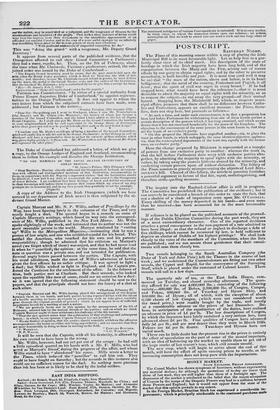POSTSCRIPT.
SATURDAY NIGHT.
The Times of this morning comes within a step of placing the Irish Municipal Bill in its most favourable light. Let us help hint to a per-
fectly clear view of its chief merit. His description of the state of bondage in which the Irish majority have been long held, and of the exasperation between the Many and the Few, arising out of recent efforts by one party to obtain equal rights, and by the other to preserve ascendancy, is both forcible and just. It is most true (and well it may be so) that " the mass of the nation, above and below, is in its heart belligerent ; that the mind of the country, Protestant and Popish, is all fever; that the spirit of civil war rages in every breast." If he had stopped here, what would have been the inference 2—that it is most desirable to admit the majority to equal rights with the minority, so as to remove the subject—to cut away the very ground—of their mutual hatred. Stopping here, the Ministerihl bill, which, as respects muni- cipal affairs, proposes that there shall be no difference between Catho- lics and Protestants, appears an excellent measure : the Times, there- fore, does not stop here, but proceeds as follows- " At such a time, and under such circumstances, is it, that a proposition has been laid before Parliament for withdrawing from one of these hostile parties a certain description of the powers which it has long exercised, and which no one denies that it has not exercised beneficially for the peace of the kingdom. The objection to the continuance of the same powers in the same hands is, that they are the hands of an exclusive party. " On this proposal the Ministers have engrafted another—viz. to place the trust in other hands, to which unhappily, the same identical objection applies— viz. that the contemplated depositories of the bust are, equally with the former ones, an exclusive party."
Here the change proposed by Ministers is represented as a transfer of powers from one exclusive party to another : whereas the truth is, that the bill before Parliament does away with exclusive parties alto- gether, by admitting the majority to equal rights with the minority, or rather, by taking away the powers hitherto abused by the minority, and conferring certain powers upon all without distinction. The fallacy of the Times consists in grossly misrepresenting the objects of Lord MEL- BOURNE'S bill. Cleared of this fallacy, the article in question furnishes a powerful argument in favour of that fair, equal, undistinguishing, and therefore strife-quelling measure.


























 Previous page
Previous page